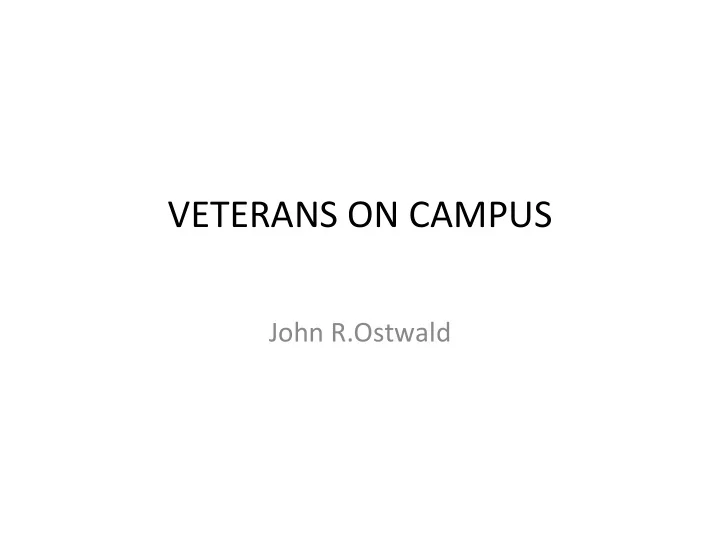

VETERANS ON CAMPUS John R.Ostwald
• Many Veterans face significant adjustment challenges when returning home after their tour of duty. This presentation will highlight some of the issues that confront veterans as they enter the college environment. Suggested strategies to assist veteran students will be delineated.
Presenter’s Background • Viet Nam era student veteran • Psychology Professor; Hudson Valley Community College, Troy, New York and Faculty Advisor to the Armed Forces Club. • Co facilitator of the War Healing Circle, a support group for veterans and their families; FUSSA, Albany, New York • Member of the Board of Advisors and College Veteran Liaison to Soldiers Heart, Troy, New York. • Newspaper Columnist, The Record, Troy, New, York. • Both parents World War II Veterans
Our School • Hudson Valley Community College, Troy, New York • Over 14,000 students • Over 300 student Veterans per semester • Visited by President Obama in 2009
Challenges for Vets on our Campus: Being different from civilian students. Abuse of Alcohol and other drugs. PTSD Symptoms Depression and Suicidal Ideation/Attempts. TBI Intermittent deaths of former comrades. Arrested Development. Prior incarceration. Frequent and unpredictable deployments that interfere with academic planning .
Suggested Strategies: • Conduct workshops for the staff on veterans’ issues. • Create a “Vet Friendly Zone” on campus. • Survey vets, who have enrolled, to determine how to create a Vet friendly campus. • Start an Armed Forces Club and develop a website. • Have and open house for veterans before the start of the semester. • Encourage the use of the counseling center on campus. • Hire a Veteran advisor/mentor.
Sternberg’s Triarchic Theory of Intelligence • Develop a rapport with the local county/state/federal workers who review financial assistance forms not associated directly with the GI Bill or academics. • Learn to separate a “poseur” from a legitimate helper. Identify the commitment of the agency, college, or other institution by seeing consistent positive behavior related to veterans and a financial commitment to help. • Be courageous, creative and innovative. These are very complex issues that require unique approaches.
Thank You
Recommend
More recommend